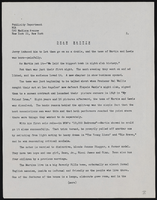Search the Special Collections and Archives Portal
Search Results
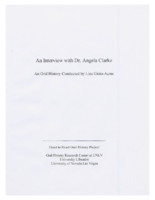
Transcript of interview with Dr. Angela Clarke by Lisa Gioia-Acres, October 3, 2008
Date
Archival Collection
Description
Interview with Dr. Angela Clarke conducted by Lisa Gioia-Acres on October 3, 2008. A native of Baltimore, Maryland, Clarke spent a great deal of time reading medical texts and started working at Social Security by the age of fourteen. Following high school, she joined the women's Air Force and attended Morgan State College on the GI Bill. Clarke recalls instances of racism and the efforts she personally made to mitigate or change circumstances for blacks. Among her many awards, she was given a plaque for integrating Air Force swimming pools. Later accepted at University of Maryland, her first year's tuition was paid by the Jessie Smith Noyes Foundation. Clarke lived and practiced medicine in Beverly Hills until 1976, when a friend suggested that she was needed in Las Vegas as a board-certified family practitioner.
Text
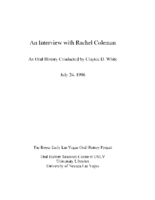
Transcript of interview with Rachel Coleman by Claytee D. White, July 24, 1996
Date
Archival Collection
Description
Interview with Rachel Coleman conducted by Claytee D. White on July 24, 1996. Born in Fayette, Mississippi, Coleman moved to Las Vegas in the 1950s and began washing dishes at the Tropicana. In 1969, having worked for a number of hotels, she was promoted to executive housekeeper at The Hacienda. She ran for president of the Culinary Workers Union Local 226 in 1987. Coleman recalls Las Vegas race and labor relations through the decades.
Text

Transcript of interview with Rev. Marion D. Bennett, Sr. by Claytee D. White, January 12, 2004
Date
Archival Collection
Description
Interview with Rev. Marion D. Bennett, Sr. conducted by Claytee D. White on January 12, 2004. Bennett grew up in Greenville, South Carolina and graduated from Morris Brown College before earning his Master of Divinity from the Interdenominational Theological Center in Atlanta. He moved to Las Vegas in 1960 to pastor Zion United Methodist Church, ultimately growing his congregation to over six hundred members. Bennett speaks candidly about the racial tension that the Las Vegas community endured during integration and his fight to establish the Equal Rights Commission in Nevada. In 1973, he ran for the Nevada State Assembly and served for ten years, focusing on quality education and employment along with healthcare and equal rights.
Text

Transcript of interview with Mike and Sallie Gordon by Adriane Massa, March 2, 1977
Date
Archival Collection
Description
Mike Gordon speaks about their liquor stores and lists his occupation as a bartender. Among the civic organizations that he participated in were: Young Democrats, Eagles Lodge, Lions Club, past president of Temple Beth Sholom and B'nai B'rith Lodge. Together Mike and Sallie recall the growth and changes of the valley they have witnessed between the early 1930s and mid-1970s. Among his anecdotes is one about the carrying of payroll checks to Boulder Dam to avoid "interference" (robberies).
Mike and Sallie were among the very first people of Jewish ancestry to make their way to Las Vegas. They arrived January 26, 1932 to join relatives of Sallie?s who had moved to Las Vegas when the Boulder Dam construction began. They had married in 1930 in Pittsburgh, Pennsylvania. Soon they were involved members of a small but growing group of Jewish pioneers and helped found Temple Beth Sholom, the community?s first synagogue. Mike speaks about their liquor stores and lists his occupation as a bartender. Among the civic organizations that he participated in were: Young Democrats, Eagles Lodge, Lions Club, past president of Temple Beth Sholom and B?nai B?rith Lodge. Together Mike and Sallie recall the growth and changes of the valley they have witnessed between the early 1930s and mid-1970s. Among his anecdotes is one about the carrying of payroll checks to Boulder Dam to avoid ?interference? (robberies).
Text
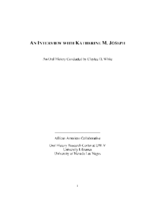
Transcript from interviews with Katherine M. Joseph by Claytee White, October 25, 2004 and September 5, 2007
Date
Archival Collection
Description
Two-session interview with Katherine M. Joseph by Claytee White, October 25, 2004, and September 5, 2007. Joseph is a community activist and was a co-worker of Lubertha Johnson, and involved with Operation Independence. In the interview, Johnson discusses her family, her employment, and life on the Westside.
Text
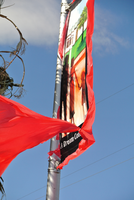
Photograph at Berkley Square Historic District banner unveiling event, February 9, 2013
Date
Archival Collection
Description
Official unveiling of "Dream Come True" banner in the Berkley Square Historic District of Las Vegas, February 9, 2013.
Image
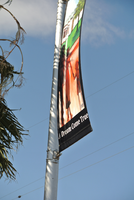
Photograph at Berkley Square Historic District banner unveiling event, February 9, 2013
Date
Archival Collection
Description
Official unveiling of "Dream Come True" banner in the Berkley Square Historic District of Las Vegas, February 9, 2013.
Image


